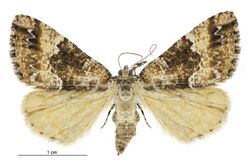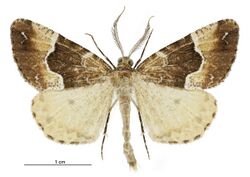Biology:Pseudocoremia insignita
| Pseudocoremia insignita | |
|---|---|

| |
| Female | |

| |
| Male | |
| Scientific classification | |
| Domain: | Eukaryota |
| Kingdom: | Animalia |
| Phylum: | Arthropoda |
| Class: | Insecta |
| Order: | Lepidoptera |
| Family: | Geometridae |
| Genus: | Pseudocoremia |
| Species: | P. insignita
|
| Binomial name | |
| Pseudocoremia insignita (Philpott, 1930)[1]
| |
| Synonyms[2] | |
| |
Pseudocoremia insignita, also referred to by the common name tree nettle flash, is a species of moth in the family Geometridae.[3][4] It is endemic to New Zealand.[1]
Taxonomy
This species was first described by Alfred Philpott in 1930 under the name Selidosema insignita.[5] In 1988 J. S. Dugdale synonymised P. pergrata into this species, however in 2003 P. pergrata was reinstated as species separate from P. insignita.[4][2]
Description
Philpott described the species as follows:
♂. 32 mm. Head and palpi brown. Thorax greyish brown. Antennae brown, in ♂ moderately bipectinated, pectinations gradually decreasing in length apically, last twelve or thirteen segments simple. Abdomen greyish ochreous, sprinkled with fuscous. Legs ochreous, mixed with fuscous, anterior pair blackish, all tarsi annulated with ochreous. Forewings elongate triangular, costa moderately arched, apex blunt, termen bowed, oblique; whitish ochreous; basal 3/5 fuscous brown; first line indicated by ochreous outwards-curved fascia on costa at 1/4; outer edge of median band (margin of dark area) broadly and strongly projecting at middle, margined with white; a broad brownish terminal area including obscure white waved subterminal line: fringes (damaged) apparently brown mixed with ochreous. Hindwings pale ochreous sparsely sprinkled with brown; an interrupted brown line round termen: fringes ochreous.[5]
Philpott noted that the shape of the outer median band margin differed from all other New Zealand species in the (then) Selidosema genus. The holotype was collected from Kaeo in the Far North District on 16 January 1921 by C. B. Clarke, and kept in the collection of Auckland War Memorial Museum.[5][6]
Gallery
References
| Wikimedia Commons has media related to Pseudocoremia insignita. |
- ↑ 1.0 1.1 "Pseudocoremia insignita (Philpott, 1930)". https://www.nzor.org.nz/names/a73914b9-6836-4178-88ea-6adc6b29050d.
- ↑ 2.0 2.1 , Wikidata Q54601619
- ↑ , pp. 459, Wikidata Q45922947
- ↑ 4.0 4.1 , pp. 167-168, Wikidata Q45083134
- ↑ 5.0 5.1 5.2 , Wikidata Q58676529
- ↑ "Pseudocoremia insignita". Auckland War Memorial Museum. https://www.aucklandmuseum.com/collections-research/collections/record/am_naturalsciences-object-139461.
Wikidata ☰ Q13558195 entry
 |





